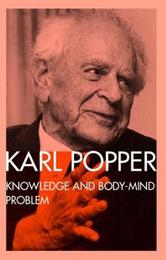
|
Knowledge and the Body-Mind Problem: In Defence of Interaction
Paperback
Main Details
| Title |
Knowledge and the Body-Mind Problem: In Defence of Interaction
|
| Authors and Contributors |
By (author) Sir Karl Popper
|
| Physical Properties |
| Format:Paperback | | Pages:168 | | Dimensions(mm): Height 216,Width 138 |
|
| Category/Genre | Western philosophy from c 1900 to now
Philosophy of the mind |
|---|
| ISBN/Barcode |
9780415135566
|
| Classifications | Dewey:128.2 |
|---|
| Audience | | Undergraduate | | Postgraduate, Research & Scholarly | | Professional & Vocational | |
|---|
| Illustrations |
illustrations
|
|
Publishing Details |
| Publisher |
Taylor & Francis Ltd
|
| Imprint |
Routledge
|
| Publication Date |
28 December 1995 |
| Publication Country |
United Kingdom
|
Description
Based upon the Kenan Lectures that Karl Popper delivered at Emory University in 1969, Knowledge and the Body-Mind Problem raises problems connected with human freedom, creativity, rationality, and the relationship between human beings and their actions. These are what Popper calls big issues - too big for easy answers, but too important to be ignored. In these lectures, and in the discussions that follow them, Sir Karl develops a theory of body-mind interaction. This theory involves evolutionary emergence, human language, and that realm of autonomous products of the human mind which Popper calls World 3. According to Popper, consciousness emerged in the course of evolution as a kind of control system for the body, like a driver is a control system for a car. Objective knowledge - the kind of knowledge that is found in books and libraries - then emerged in the course of evolution as a higher level control system for the mind. Simply put, objective knowledge is the mind's control system for critical problem solving. In this way, full consciousness - the kind of consciousness that humans can have - is anchored in World 3 and is closely linked to human language, problems, theories, and criticism. And it is mainly through this use of objective knowledge as a control system for critical problem solving that we are able to exercise our freedom, creativity, and rationality - first by making contributions, like science books and works of art, to World 3; and then by using these contributions to bring about changes in Worlds 1 and 2. The Kenan Lectures were well-attended and provoked lively discussions. This book is published in the same informal language in which they were originally delivered and so can be easily understood by a general audience.
|